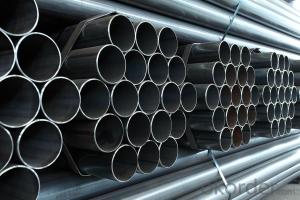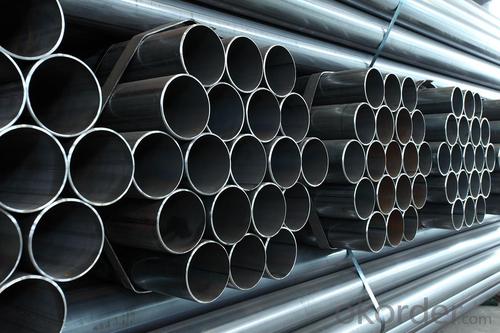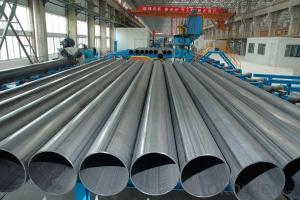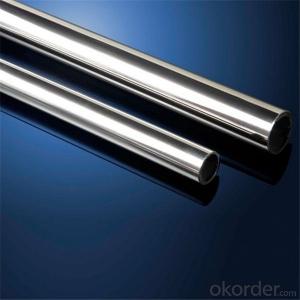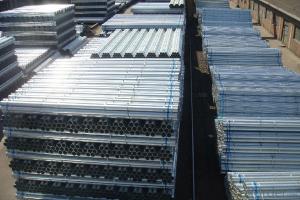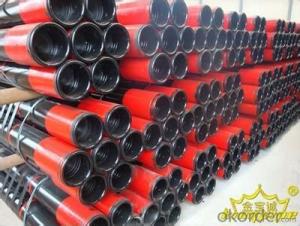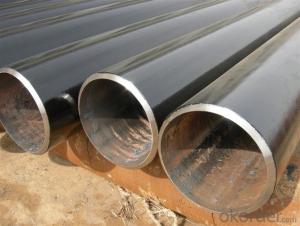ERW STEEL PIPE ROUND STEEL PIPE MS PIPE PRICES FROM CHINA MANAFACTURES
- Loading Port:
- China Main Port
- Payment Terms:
- TT OR LC
- Min Order Qty:
- -
- Supply Capability:
- -
OKorder Service Pledge
Quality Product, Order Online Tracking, Timely Delivery
OKorder Financial Service
Credit Rating, Credit Services, Credit Purchasing
You Might Also Like
1 Product Description of api 5l steel pipe
1.Hydrostatic or Nondestructive Electric Test
2.Heat Treatment: according to Standard
3.Surface Condition:According to Standard.
4.Grain Size:According to standard
5.Sampling:flattening,flaring,grain size,Marking
- Q: How do you determine the weight per foot of a steel pipe?
- To determine the weight per foot of a steel pipe, you need to consider two main factors: the thickness and the diameter of the pipe. First, you need to measure the outer diameter (OD) and the wall thickness (WT) of the pipe using a caliper or a measuring tape. Once you have these measurements, you can calculate the inner diameter (ID) by subtracting twice the wall thickness from the outer diameter (ID = OD - 2 * WT). Next, use the formula for the cross-sectional area of a pipe (A = π * (OD^2 - ID^2) / 4) to calculate the cross-sectional area. Finally, multiply the cross-sectional area by the density of the steel, which is typically around 490 pounds per cubic foot, to determine the weight per foot of the steel pipe. Weight per foot (WPF) = A * 490 It's important to note that this calculation provides an estimate of the weight per foot, as manufacturing tolerances and slight variations in the density of the steel may affect the actual weight. Therefore, it is recommended to use this calculation as a guide and consult the manufacturer's specifications for more precise information.
- Q: How are steel pipes used in water transportation?
- Steel pipes are commonly used in water transportation systems as they are strong and durable, allowing for the safe and efficient delivery of water. These pipes are used to create networks that transport water from sources like reservoirs or treatment plants to homes, businesses, and other areas where water is needed. Steel pipes offer excellent corrosion resistance, ensuring the water remains clean and uncontaminated during transport. Additionally, their seamless construction minimizes leakage and ensures a consistent flow of water, making them an ideal choice for water transportation infrastructure.
- Q: What are the different methods of pressure testing steel pipes?
- There are several different methods of pressure testing steel pipes, including hydrostatic testing, pneumatic testing, and ultrasonic testing. Hydrostatic testing involves filling the pipe with water and pressurizing it to a specified level to check for leaks or weaknesses. Pneumatic testing is similar but uses compressed air or gas instead of water. Ultrasonic testing involves using high-frequency sound waves to detect any defects or flaws in the pipe. Each method has its own advantages and is chosen based on the specific requirements and industry standards.
- Q: What are the different types of steel pipe coatings for underground applications?
- There are several types of steel pipe coatings used for underground applications, including fusion bonded epoxy (FBE) coating, three-layer polyethylene (3LPE) coating, three-layer polypropylene (3LPP) coating, and coal tar enamel (CTE) coating. Each of these coatings provides different levels of protection against corrosion and abrasion, ensuring the longevity and durability of the steel pipes in underground environments.
- Q: Can steel pipes be used for underwater applications?
- Yes, steel pipes can be used for underwater applications. Steel is a strong and durable material that can withstand the harsh conditions of underwater environments, making it suitable for various applications such as offshore oil and gas exploration, underwater construction, and marine infrastructure. Additionally, steel pipes can be coated with protective layers to prevent corrosion and ensure long-term performance underwater.
- Q: How are steel pipes used in power plants?
- Steel pipes are extensively used in power plants for various applications. One of the primary uses of steel pipes in power plants is for transporting fluids and gases. These pipes are used to carry water, steam, and fuel (such as oil or gas) throughout the power plant. The high strength and durability of steel make it an ideal material for these pipes, as they can withstand high pressure and temperature conditions. Steel pipes are also used in power plant boilers. They form an integral part of the boiler system, where they carry hot gases and steam. These pipes are designed to withstand extreme heat and pressure, ensuring the safe and efficient operation of the boiler. Additionally, steel pipes are used in the cooling systems of power plants. Water is circulated through these pipes to cool down the equipment, such as turbines and condensers. The pipes are designed to withstand corrosion from the cooling water and maintain the required flow rate and pressure. Furthermore, steel pipes are used in the construction of power plant structures. They are used for the fabrication of support structures, such as frames, platforms, and walkways. Steel pipes provide excellent structural integrity and can withstand heavy loads, making them suitable for such applications. In summary, steel pipes play a vital role in power plants by transporting fluids and gases, serving as a part of the boiler system, facilitating cooling processes, and providing structural support. Their strength, durability, and resistance to extreme conditions make them an essential component in the operation of power plants.
- Q: How are steel pipes used in the manufacturing of food processing machinery and equipment?
- Due to their numerous advantageous properties, steel pipes are essential in the manufacturing of food processing machinery and equipment. They are widely used in the food industry for their durability, ability to withstand high temperatures and pressures, and resistance to corrosion. The primary use of steel pipes in food processing machinery is for transporting fluids and gases. These pipes are responsible for carrying water, steam, liquids, air, and gases throughout the processing plant. By utilizing steel pipes, the food industry can ensure the reliable and hygienic transfer of these substances, maintaining the quality and safety of food products. Steel pipes also play a crucial role in the design and construction of food processing equipment such as mixers, blenders, conveyors, and canning machines. These machines require pipes to facilitate the movement of ingredients, processing fluids, and cleaning agents. Steel pipes, with their high strength, can handle the heavy loads and pressures associated with food processing operations, making them an ideal choice for such applications. Another significant benefit of steel pipes in food processing machinery is their resistance to corrosion. With the use of various acidic and alkaline substances, as well as hot water and steam, corrosion can occur in other materials. However, steel pipes, especially those made from stainless steel, exhibit a high resistance to corrosion. This ensures that the machinery remains in optimal condition, prolonging its lifespan. Furthermore, the smooth internal surface of steel pipes allows for efficient and hygienic cleaning. This minimizes the accumulation of food particles and contaminants, which is crucial in the food industry. By maintaining high levels of cleanliness, the growth of bacteria can be prevented, ensuring food safety. In conclusion, steel pipes are indispensable in the manufacturing of food processing machinery and equipment. Their durability, resistance to corrosion, ability to handle high temperatures and pressures, and hygienic characteristics make them the ideal choice for transporting fluids and gases, as well as constructing various food processing equipment.
- Q: How are steel pipes used in the telecommunications industry?
- Steel pipes are commonly used in the telecommunications industry for the installation of underground and overhead cables. These pipes provide a protective casing for the cables, ensuring their safety from external elements and physical damage. Additionally, steel pipes are used in the construction of telecommunication towers and infrastructure, providing support and stability for antennas, satellite dishes, and other communication equipment.
- Q: What are the advantages of using steel pipes in plumbing systems?
- There are several advantages of using steel pipes in plumbing systems. Firstly, steel pipes are highly durable and have a long lifespan, making them a reliable choice for plumbing installations. They are resistant to corrosion, rust, and other forms of damage, ensuring the integrity of the plumbing system over time. Additionally, steel pipes have a high tensile strength, allowing them to withstand high pressure and heavy loads without deformation or leakage. They also have excellent heat resistance, making them suitable for hot water and steam applications. Lastly, steel pipes offer a smooth inner surface, minimizing friction and maintaining a consistent flow rate, which is crucial for efficient water distribution and drainage in plumbing systems.
- Q: What industries typically use steel pipes?
- Steel pipes are widely used in various industries due to their durability, strength, and versatility. Some of the industries that typically utilize steel pipes include: 1. Construction: Steel pipes are extensively used in the construction industry for various applications such as structural support, plumbing, and underground piping systems. They are commonly used in commercial buildings, residential structures, bridges, and tunnels. 2. Oil and gas: The oil and gas industry heavily relies on steel pipes for drilling, transporting, and distributing oil and gas. Steel pipes are used in offshore drilling rigs, oil refineries, natural gas processing plants, and pipelines to ensure the safe and efficient transport of these valuable resources. 3. Water and wastewater: Steel pipes play a crucial role in providing clean water supply and managing wastewater. They are used in water treatment plants, desalination facilities, and municipal water distribution systems. Steel pipes are also utilized for sewage and stormwater management. 4. Manufacturing: Various manufacturing industries employ steel pipes for specific applications. For instance, automobile manufacturers use steel pipes in exhaust systems, fuel lines, and hydraulic systems. Steel pipes are also used in the manufacturing of machinery, equipment, and appliances. 5. Mining: The mining industry requires strong and durable materials for its operations. Steel pipes are used in mining applications such as conveying materials, ventilation systems, and underground infrastructure. They are particularly useful in transporting minerals, ores, and other mining byproducts. 6. Energy and power: Steel pipes are extensively used in power generation facilities, including thermal power plants, nuclear power plants, and renewable energy installations. They are utilized in steam pipelines, cooling systems, and heat exchangers. Steel pipes are also employed in the construction of transmission lines for electricity distribution. 7. Infrastructure and transportation: Steel pipes are essential for infrastructure development and transportation systems. They are used in the construction of roads, bridges, railways, and airports. Steel pipes are also utilized in the transportation of fluids and gases, such as in pipelines for natural gas or petroleum products. Overall, the versatility and reliability of steel pipes make them indispensable in a wide range of industries, contributing to various aspects of our modern infrastructure and daily lives.
Send your message to us
ERW STEEL PIPE ROUND STEEL PIPE MS PIPE PRICES FROM CHINA MANAFACTURES
- Loading Port:
- China Main Port
- Payment Terms:
- TT OR LC
- Min Order Qty:
- -
- Supply Capability:
- -
OKorder Service Pledge
Quality Product, Order Online Tracking, Timely Delivery
OKorder Financial Service
Credit Rating, Credit Services, Credit Purchasing
Similar products
Hot products
Hot Searches
Related keywords
